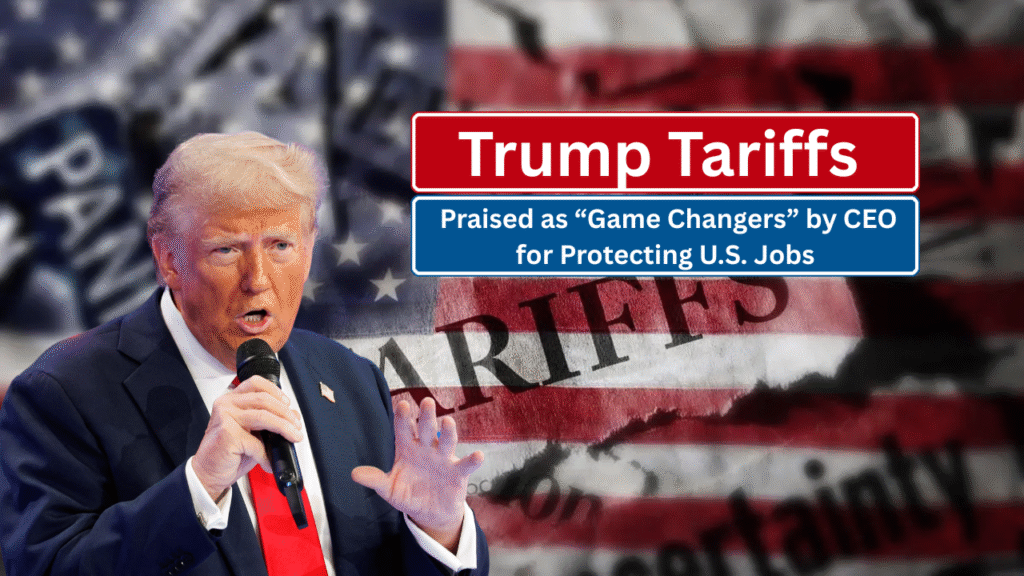In recent years, the impact of President Donald Trump’s trade policies-particularly the tariffs imposed on foreign imports-has been the subject of intense debate. However, one sector that has seen a positive shift as a result of these tariffs is the American manufacturing industry. According to recent comments from a leading manufacturing CEO, the tariffs introduced during the Trump administration are being hailed as “game changers” for saving American jobs and reviving industries that were once at risk of outsourcing.
The Trump Tariffs: A Major Shift in Trade Policy
When President Trump announced his decision to impose tariffs on steel, aluminum, and other foreign goods, the move was seen as controversial. Critics argued that such tariffs would raise costs for American consumers and harm businesses reliant on imports. However, Trump’s supporters maintained that these tariffs were necessary to protect American industries from unfair foreign competition, particularly from countries like China.
According to the CEO of a major manufacturing company, the tariffs have had a tangible and positive effect. “These tariffs have been a game changer for us,” said the CEO in a recent statement. “They’ve helped level the playing field, allowing American manufacturers to compete more fairly, and most importantly, they’ve saved American jobs.”
Boost to Domestic Manufacturing
The tariffs, which were enacted in 2018, targeted billions of dollars’ worth of goods from various countries, including China, the European Union, Canada, and Mexico. The goal was to reduce the U.S. trade deficit and encourage American companies to invest in domestic production rather than relying on cheaper imports.
For manufacturers in the U.S., this shift has led to increased demand for domestically produced goods. With foreign-made products becoming more expensive due to the tariffs, American-made products have become more attractive to both consumers and businesses.
One notable success story has been in the steel and aluminum industries, where American producers have seen a significant uptick in business. According to the CEO, the company’s steel production has increased by nearly 20% since the tariffs were put in place, and they’ve added dozens of new jobs in the process.
“Before the tariffs, we were struggling to keep up with cheaper imports from countries like China,” said the CEO. “Now, we’re not only able to compete, but we’re thriving and hiring more people. The tariffs have helped us stay in business and grow.”
Saving American Jobs
One of the most significant claims made by proponents of the Trump tariffs is their role in saving and even creating jobs in key industries. According to data from the U.S. Department of Commerce, employment in the manufacturing sector rose after the tariffs were enacted, particularly in industries like steel and machinery manufacturing.
The CEO of the manufacturing company emphasized that the tariffs have had a direct impact on job retention and job creation within their organization. “We’ve been able to avoid layoffs and have even expanded our workforce,” said the CEO. “These are good-paying, union jobs that support families across America.”
The argument is that without the tariffs, many of these manufacturing jobs would have been sent overseas, as companies sought cheaper labor and materials abroad. Instead, the tariffs have allowed American companies to remain competitive in a global market, protecting domestic workers from outsourcing.
A Mixed Reaction Across Industries
While the tariffs have been praised by many in the manufacturing sector, not everyone in the business community is convinced of their effectiveness. Industries that rely heavily on imports, such as automotive and electronics, have faced higher costs due to the increased price of raw materials like steel and aluminum.
Some critics argue that these increased costs are ultimately passed on to consumers in the form of higher prices for goods, which can hurt middle-class families. The automotive industry, in particular, has warned that the tariffs could lead to higher prices for cars and components, which could dampen consumer demand.
Additionally, some foreign trading partners, including China and the European Union, retaliated with their own tariffs on U.S. goods, further complicating the trade landscape. However, the Trump administration has maintained that the long-term benefits of these trade policies will outweigh the short-term challenges.
A Long-Term Strategy for American Manufacturing?
Looking ahead, there is a sense of cautious optimism in the manufacturing sector about the future of American industry. The tariffs have led to a shift in how American companies approach global trade, encouraging a focus on domestic production and job creation.
The CEO pointed to the importance of continuing to support American workers through policies that foster growth in manufacturing. “We need policies that put American workers first,” the CEO said. “The tariffs are part of a broader strategy that’s helping to rebuild American manufacturing, and we’re seeing the results firsthand.”
The broader economic impact of the tariffs remains a topic of debate, but for now, the manufacturing industry is reaping the benefits of President Trump’s trade policies. Whether these “game-changing” tariffs will lead to sustained growth for American manufacturing or whether other sectors will face further challenges is yet to be seen. However, one thing is clear: the tariffs have made a significant impact on the lives of American workers, especially in industries like steel production, and have played a role in keeping thousands of manufacturing jobs on U.S. soil.
Conclusion
The Trump administration’s tariffs have had a transformative effect on American manufacturing, according to industry leaders. For some, these trade policies have helped revive the sector, saving jobs and boosting domestic production. While the broader economic effects continue to evolve, one thing is certain: tariffs have reshaped the way many manufacturers approach global competition and domestic job creation.

